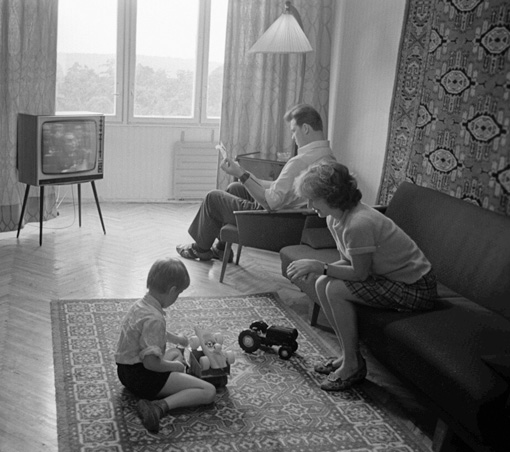Screening Socialism: TV and Everyday Life in Socialist Eastern Europe
To understand the distinctiveness of socialist television, the Screening Socialism project therefore looks beyond its political uses and elite understandings, and considers the role of television in everyday life, taking into account the views and practices of both television professionals and audiences. This perspective allows us to develop a more sophisticated understanding of the relationship between socialist societies, television, and the Party-state. Instead of a media culture suffocated under the weight of a totalitarian Party-state, what emerges from the analysis is a more dynamic reality that allowed for multiple forms of appropriation and negotiation of official media policies, ranging from wholehearted embrace to circumvention and even localised resistance. What this approach also shows is the importance of tacitly accepted conventions, such as those engrained in the routines of television viewing, or in the taken-for-granted ways of structuring television schedules. It is precisely these ‘banal’ aspects of socialist television that help us understand how socialist television could sustain the communist project while also, paradoxically, undermining its mobilizing potential.
More precisely, the key questions addressed by the project are:
- How did the political and cultural elites conceive of television and its social and political role, how did their attitudes change over time and how did they vary transnationally?
- What were the dominant narratives and values promoted by television programming, especially with regard to understandings of time and history, the relationship between the public and the private domain, as well as perceptions of national community and its position in the global socialist project? How did these narratives change over time, and vary transnationally?
- What was the role of television in everyday life, both with regard to the role of television in structuring everyday temporal routines and perceptions of time, as well as in shaping a sense of domestic space and its relationship with wider, public spaces, at both national and transnational level? How did this change over time, and was there any significant variation across countries in this respect?
- Finally, how is socialist television remembered today, and how are these memories shaped by both past and present experiences?

“Worker’s family”. The family of a calculating and control machine factory worker in a standard apartment in Kiev (RIA Novosti archive, image #77629 / Boris Kavashkin / CC-BY-SA 3.0).
Beyond these scholarly aims and questions, Screening Socialism also seeks to popularise the knowledge about socialist television among a wider audience, and raise awareness of its importance as an integral part of European audiovisual heritage. In contrast to Western Europe, where television heritage has slowly gained in recognition and increasingly often features in museum exhibitions and dedicated archival collections, the vast body of material produced in Eastern Europe is often hidden from view and difficult to access. To encourage a greater public awareness of this heritage, Screening Socialism is making some of its findings openly available on its website (http://www.lboro.ac.uk/departments/socialsciences/screening-socialism/). At the moment this includes selected visual materials, brief television histories, and publications to date. These materials will be updated as the project develops, and complemented by excerpts from life story interviews. The project’s facebook group, which currently counts over 500 members, is also used as a means of quick dissemination of interesting facts about socialist television and other materials related to the project (https://www.facebook.com/groups/screeningsocialism/). In addition, Screening Socialism also contributed to an exhibition on everyday life in socialist Yugoslavia, which opened at the Museum of Yugoslav History in Belgrade, Serbia, in December 2014, and included several exhibits related to television (http://www.mij.rs/en/exhibitions/250/they-never-had-it-better.html). Over the coming years, the exhibition is scheduled to travel to neighbouring countries in South-eastern Europe.

 Learning on Screen
Learning on Screen